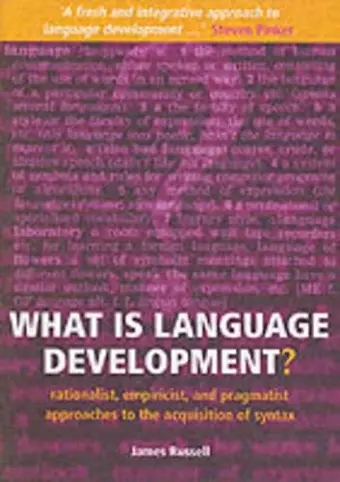What is Language Development?
Rationalist, empiricist, and pragmatist approaches to the acquisition of syntax
Format:Paperback
Publisher:Oxford University Press
Published:8th Jul '04
Currently unavailable, and unfortunately no date known when it will be back

An important book for psychologists, linguists, and philosophers
Language development is one of the major battle grounds within the humanities and sciences. This book presents an account of the three dominant theories of language development.Language development is one of the major battle grounds within the humanities and sciences. This is the first time that the three major theories in language development research have been fully described and compared within the covers of a single book. The three approaches: (1) The rationalism of Chomsky and the syntactic nativism that it entails; (2) The empiricism instinct in connectionist modelling of syntactic development; (3) The pragmatism of those who see the child as actively 'constructing' a grammatical 'inventory' piece-by-piece through recruiting general learning abilities and socio-cognitive knowledge. The book is unique in striking a balance between broad philosophical assessment of these three theories and fine-grain, fairly technical, accounts of how they fare at the empirical and linguistic 'coal faces'. In Part 1, the kind of psychology to which rationalism, empiricism, and pragmatism give rise are described with reference to philosophers such as Fodor, Hume, and the American pragmatists from Peirce, to Rorty and Brandom. After an introduction to the syntactic analysis of the sentence, Part 2 continues with an account of the evolution of Chomskyan theory from its inception to the present day, followed by a review of developmental research inspired by it. Part 3 takes a sceptical look at connectionist modelling of syntactic development. Part 4 describes the kind of linguistic theories that the socio-cognitive approach finds sympathetic, reviewing its empirical progress (e.g. the work of Tomasello), ending with a comparison of how the generativists and functionalists tackle the evolution of syntax. Clearly and accessibly written, the book will be an important text for developmental psychologists, linguists, and philosophers working on language.
...an important addition to the literature on first language acquisition, and could be very useful as a supplementary text in graduate seminars. * Journal of Child Language, Vol 32, No 1 *
...this book is a remarkable piece of work...[and] it will appeal to scholars of the language sciences and to graduate students who are coming to grips with their own thoughts on where language comes from. * Applied Cognitive Psychology, Vol 19, No 5 *
A fresh and integrative approach to language development. Russell is to be applauded for injecting some hard new thinking into this difficult topic. * Steve Pinker *
ISBN: 9780198530862
Dimensions: 239mm x 169mm x 33mm
Weight: 1g
572 pages